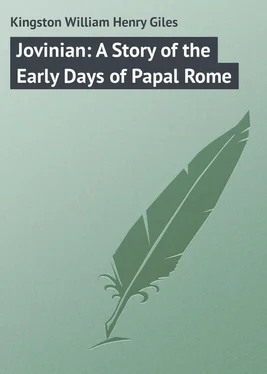William Kingston - Jovinian - A Story of the Early Days of Papal Rome
Здесь есть возможность читать онлайн «William Kingston - Jovinian - A Story of the Early Days of Papal Rome» — ознакомительный отрывок электронной книги совершенно бесплатно, а после прочтения отрывка купить полную версию. В некоторых случаях можно слушать аудио, скачать через торрент в формате fb2 и присутствует краткое содержание. Жанр: foreign_prose, на английском языке. Описание произведения, (предисловие) а так же отзывы посетителей доступны на портале библиотеки ЛибКат.
- Название:Jovinian: A Story of the Early Days of Papal Rome
- Автор:
- Жанр:
- Год:неизвестен
- ISBN:нет данных
- Рейтинг книги:3 / 5. Голосов: 1
-
Избранное:Добавить в избранное
- Отзывы:
-
Ваша оценка:
- 60
- 1
- 2
- 3
- 4
- 5
Jovinian: A Story of the Early Days of Papal Rome: краткое содержание, описание и аннотация
Предлагаем к чтению аннотацию, описание, краткое содержание или предисловие (зависит от того, что написал сам автор книги «Jovinian: A Story of the Early Days of Papal Rome»). Если вы не нашли необходимую информацию о книге — напишите в комментариях, мы постараемся отыскать её.
Jovinian: A Story of the Early Days of Papal Rome — читать онлайн ознакомительный отрывок
Ниже представлен текст книги, разбитый по страницам. Система сохранения места последней прочитанной страницы, позволяет с удобством читать онлайн бесплатно книгу «Jovinian: A Story of the Early Days of Papal Rome», без необходимости каждый раз заново искать на чём Вы остановились. Поставьте закладку, и сможете в любой момент перейти на страницу, на которой закончили чтение.
Интервал:
Закладка:
“I would, as a sacred duty, take charge of the orphan boy, and instruct him in the truth, so that he may be qualified to perform his duty in spreading the Gospel,” said Severus.
“And I will let him share a mother’s love with our young Julia,” said Eugenia.
“Tell Amulius what you have heard, Rufina,” said Gentianus; “and now return to the city, thank those who have provided for our necessities, and bring us, we pray thee, intelligence of anything important Amulius deems it necessary to send.”
The assembly now broke up. Rufina returned by the way she had come, accompanied by several persons who had visited the abode of Gentianus for the purpose of joining in the religious meeting, but who lived above ground in the neighbourhood of Rome. Some regained the upper world by different outlets; besides Gentianus and his household, a few only, who for some cause had reason to dread the hostility of the idolaters still, remaining in those subterranean passages. Here, in chambers excavated in the soft rock, they had their dwellings, which they quitted only at night to enjoy the fresh air, when trusty persons were placed on the watch to give notice of the approach of any who might betray them. Many of the fossors or excavators had from the early days of Christianity been converted, and had thus been able to act as guides to the fugitives from persecution, and to hollow out chambers in the remoter parts of the galleries where they could live without being discovered, unless, as was sometimes the case, they were betrayed by the treachery of pretended Christians.
Chapter Four.
The Procession
The sun had scarcely risen half-way to the meridian when the head of the sacrificial procession streamed forth from the Temple of Peace, in the wide forum belonging to which its component parts had been collected and arranged. Preceded by banners came the pontiffs of the sacred college, walking under silken canopies to shield their persons from the sun’s burning rays. They were followed by the augurs in saffron and purple togas, wearing on their heads the conical caps with spikes of olive-wood, and carrying the litui – long staffs with golden crooks at the ends 1 1 Ever since borne by the bishops of the Roman Church.
. Then came the tubicini, or trumpeters, sounding loudly on their curved instruments of bronze with shrill notes, and the tubas, straight silver trumpets, hollowing them, with various ensigns and insignia, emerged the chief flamens, wearing the laena and apex, with wreaths of laurel. Now, after a profusion of banners, appeared a chariot drawn by four white steeds, richly adorned with wreaths, bearing along a magnificent statue of Jupiter Tonans 2 2 One day to appear in the edifice dedicated to Saint Peter, to act the part of the apostle; the ignorant multitude being taught by the modern flamens devoutly to kiss its toe.
, with thunderbolts in hand, followed by superb statues, larger than life, of Mars, Apollo, Juno, Venus, and Minerva – the goddesses habited in robes either supplied by pious matrons or from the properties of the temples. The car of Juno, adorned with peacocks’ feathers 3 3 Still used in the papal processions.
, that of the Cytherean Venus, with apple in hand, was drawn along, her car bearing imitations of swans and doves, and ornamented with wreaths of myrtle and roses. The car of Minerva followed, the goddess represented by a gigantic statue, a sphinx in the middle of the helmet, supported on either side by griffins, while standing on her car were huge dragons, cocks, and owls, with branches of the olive-tree arranged upon it. All these cars were drawn, not by horses, but by young patricians, who eagerly sought the opportunity to perform so grateful a service to the deities they worshipped. In a long line came other gods and goddesses, not seated in cars, but placed on high platforms, carried by men, some appearing singly and others in groups, representing the various actions for which they were renowned. Between each god or goddess walked youths, swinging censers, emitting as they moved them to and fro sweet odours grateful to their divinities. The bearers of the almost countless images were, like those who drew the chariots, mostly patricians, or young men of wealth of plebeian family, who thus sought an easy mode of exhibiting their piety.
Now came, preceded by lictors with their fasces, the vestal virgins, seated in silver chariots drawn by milk-white steeds, followed closely by another band of flamens, leading a long line of hostia (oxen to be sacrificed), their horns richly gilded, their heads adorned with wreaths, each animal led by a victimarius. So numerous were they, that it appeared as if the line would never end; for Coecus had arranged to offer up a whole hecatomb of victims.
Following the hostia came another band of trumpeters with numerous banners, the ornaments at their summits glittering in the sun; with a band of inferior priests, minor flamens, popos 4 4 The popes were priests appointed to put the victims to death.
, and other attendants at the temples, chanting loudly in honour of their gods; while next came large parties of citizens in festive dresses, eager to show their affection for the long-established religion of their ancestors; the whole followed by a body of troops, with their standards unfurled, and other insignia held aloft. The procession, as seen from a distance, had indeed the appearance of some enormous serpent with shining scales, as, emerging from the precincts of the temple, it wound its way along through the narrow streets, past the temples of Venus and Rome, under the colossal statue of Nero, on the outside of which scaffolding had been erected, affording accommodation to thousands of spectators; then turning westward, under the arch of Titus, and between the numerous temples which lined that portion of the Sacra Via, through the Forum Romanum, under the arch of Severus; when, gaining the Capitol, it proceeded direct towards the temple of Jupiter Optimus. Here the head of the vast column, the pontiffs, the flamens, and the augurs, as they arrived, gathered in due order under the porch, – the various statues of the gods being ranged on either side, the vestal virgins taking the post of honour awarded to them, while the people arranged themselves so as to leave an open space round the numerous altars, which stood prepared for the sacrifice of the victims. The animals, as they came up held by the victimarii, were arranged in front of the altars; when the flamens, having strewed their heads with roasted barley-meal, the popos, stripped and girt ready, advanced with huge hammers in their belts; then, at a signal from the chief pontiff, the fires were lighted, and each of the performers having been previously sprinkled with holy-water, the popos, holding up the heads of the animals, gave the fatal blow which brought them to the ground; when, the deadly knives being plunged into the victims’ hearts, they were rapidly and skilfully dismembered. The augurs, with due care, examined the intestines, which, being placed on the altars, were now strewed with barley-meal; and as the fires blazed up, wine was poured forth, and incense thrown upon them; the trumpets the meantime sounding, and the choristers loudly singing hymns in praise of Jupiter and the immortal gods. As the incense rose in thick clouds towards the sky from the multitudes of altars, the pontiff delivered a stirring oration to the people in praise of the gods, exhorting them to continue firm to their worship. As the pontiff ceased, the whole temple became filled with the sweet-scented smoke of the incense, the drums sounded out their loudest notes, and as the people shouted forth their vows to adhere to the ancient faith under which Rome had become great and powerful, many declared that the gods were seen to smile in approval of their piety.
Интервал:
Закладка:
Похожие книги на «Jovinian: A Story of the Early Days of Papal Rome»
Представляем Вашему вниманию похожие книги на «Jovinian: A Story of the Early Days of Papal Rome» списком для выбора. Мы отобрали схожую по названию и смыслу литературу в надежде предоставить читателям больше вариантов отыскать новые, интересные, ещё непрочитанные произведения.
Обсуждение, отзывы о книге «Jovinian: A Story of the Early Days of Papal Rome» и просто собственные мнения читателей. Оставьте ваши комментарии, напишите, что Вы думаете о произведении, его смысле или главных героях. Укажите что конкретно понравилось, а что нет, и почему Вы так считаете.












